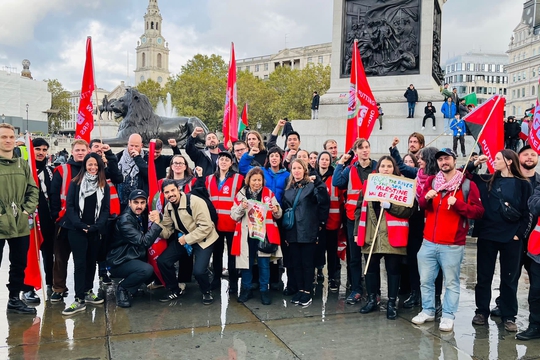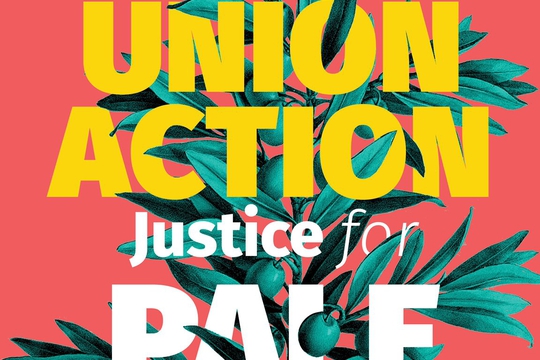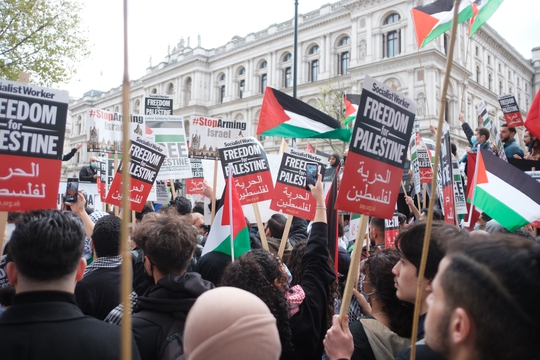Why Attend the Palestine Demos With Your Union?
by
Art Workers Forum,
Allan Struthers (@rank_and_style)
October 27, 2023
A case for supporting Palestine liberation through your union

inquiry
Why Attend the Palestine Demos With Your Union?
by
Art Workers Forum,
Allan Struthers
/
Oct. 27, 2023
A case for supporting Palestine liberation through your union
The British establishment is beginning to turn. Far too late, but it is a gain. We can add our force to this movement through attending the demos in our trade unions. To halt Israeli aggression from within the UK we need power, and there is power in organisation. Here are some reasons for participating in active support for Palestine through your union.
Collectivised Protest: attending demonstrations as an individual with a small group of mates is a fine way to show support, but you can represent something bigger and more powerful by attending as part of an organised collective. Successful protest movements involve unified and identifiable blocs of support that can speak with a collective voice. Attending as part of your union or with fellow workers in the same sector demonstrates solidarity, not just for Palestinians but also for other people in your industry who have taken the same decision to stand up for justice.
Legitimation: Trade unions are organisational bodies with specific legal protections under both UK and international law. As part of civil society, your union commands legitimacy in its legal recognition to represent the thousands of people who make up its membership. When an institute of civil society associates itself with a protest movement, it confers legitimacy onto that movement, granting it greater weight in the decision-making considerations of politicians and policy-makers.
Political Unionism: When we attend political demonstrations with our trade unions we are making the case for political trade unionism. A conservative view holds that trade unions should reserve their considerable sway for contesting issues around the conditions of work only. However, as trade unions are membership organisations with elected committees and leaders, they offer working people a relatively unusual degree of democratic power to change political matters. From a class perspective, it makes complete sense for workers to exercise our political demands through trade unions and for us to normalise the usage of this mechanism.
Network Building: Attending a demo with your union branch will put you into contact with other people in similar working situations who care about the same things as you. This is a vital opportunity to build new relationships that could make you an effective campaigner, advocate, or organiser. You never know when a contact might be helpful, or when you yourself might be helpful for someone else!
Beyond the Demo: Showing the weight of support within your union branch for an issue transfers pressure upwards to your employer’s senior management. Having an impact beyond the visible spectacle of a mass protest becomes possible when we think about how our workplaces might also carry our solidarity. When we demonstrate together in our unions, we show that a consensus might exist for pressuring our employers to implement policies in line with the Boycott, Divest, Sanction movement. Our numbers on the demo matter off the demo.
Of course there are other groupings you can be part of at the Palestine solidarity demos. Affinity groups based on politicised identity, such as Queers for Palestine, local area groups like Haringey Justice for Palestinians, religious groups, or good old-fashioned political organisations. All are ways of collectivising your protest. But one way or another, demonstrations unified into blocs that cohere our similar situations into strong unified demands are the key to effective protest. This is how we transform ourselves from spectators into actors, how we represent something bigger than just our individual selves, how we factor into history. If you are a union member and have not found a bloc with which to march, then you should attend the Palestine demos with your union!
🇵🇸 Trade Unionists for Palestine - Join the Trade Union bloc - Saturday 28 October 🇵🇸
Join the national march for Palestine this Saturday 28 October in London. Bring your union banners and flags!
Trade union bloc meeting from 11AM under Hungerford Bridge, Victoria Embankment

Allan Struthers is a member of Art Workers Forum
Subscribe to Notes from Below
Subscribe now to Notes from Below, and get our print issues sent to your front door three times a year. For every subscriber, we’re also able to print a load of free copies to hand out in workplaces, neighbourhoods, prisons and picket lines. Can you subscribe now and support us in spreading Marxist ideas in the workplace?


